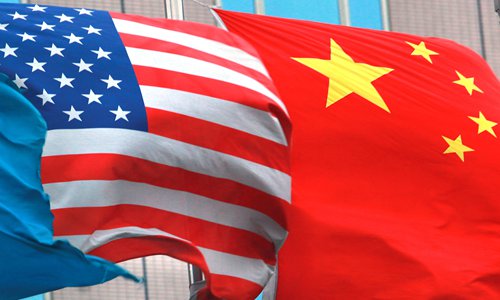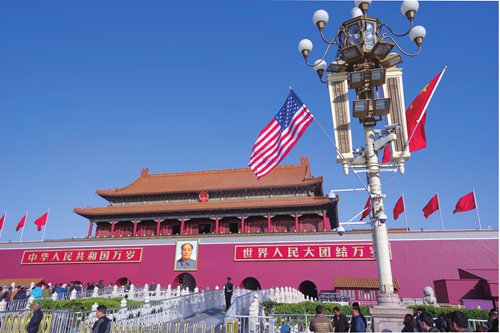HOME >> CHINA
China adapting to a new normal with the US
By Yang Sheng and Wang Cong Source:Global Times Published: 2019/9/19 18:00:35 Last Updated: 2019/9/20 16:44:54
Firms reduce reliance on American market, products

The China-US frictions are comprehensively impacting the bilateral ties at the moment. Photo: VCG
China and the US restart trade consultations at the end of this week. Whether or not negotiators for the world's two largest economies reach a final deal, Chinese people are adapting to a new normal of China-US relations, which is more competitive than cooperative.
The country seems to be using this chance to deepen reform, or at least to lower its reliance on the US and prepare for an era of "decoupling."
A serious decline in mutual trust between China and the US is a significant change and many Chinese scholars believe it is impossible to return to the bilateral relationship before the trade war when the two countries were increasingly intertwined despite competition.
Jin Canrong, associate dean of Renmin University of China's School of International Studies in Beijing, told the Global Times that in the past, cooperation and competition in the China-US relationship was about "50-50," but now it is about "30-70," and "the competition is the 70 percent, the rest is cooperation. The bilateral relationship won't return to the previous era."
An Gang, a US studies expert and senior research fellow at the Pangoal Institution, a Beijing-based think tank, said, "I used to be very sure that the new cold war wouldn't happen, but now I am not very sure. In the past, it was hard to believe China and the US would decouple from each other, but now we can really see it gradually happening."
The interdependent or intertwined trade ties used to stabilize the China-US relationship.
But now, according to the latest official expressions of the two, military ties are becoming the new "stabilizer" and Chinese experts note this change signals the fear of mutual destruction is replacing the desire for mutual benefits when the two sides need to ease tensions.

The national flags of China and the US fly at Tiananmen Square in Beijing to welcome US President Donald Trump's three-day visit to China in 2017. Photo: VCG
Increasing mistrust
Interviews with Chinese people from all walks of life - from people on the street to business leaders - paint a picture where many, including some who viewed the US positively, increasingly see a hostile US with intentions of containing China's rise.
More importantly, many are losing hope that China-US relations could go back to where they were before the trade war.
Han, who had just come back to China from Los Angeles, where he had lived for several years, said that he could not feel the tensions when he was in the US, but definitely felt it when he returned to China and tried to reapply for his visa.
"I never had any issue with my visa before, but this time, I don't know what's wrong. I haven't heard from the embassy for over a month now. I guess it is real," he said.
Han, who preferred to be identified by his first name, said that he has now started to look for jobs in Beijing. "Home is better than anywhere else, right?" he said with a bitter smile.
Frank Wang, 33, an employee at a state-owned enterprise in Beijing, told the Global Times, "I had been to the US several times as a tourist with my wife and son, and I am a huge fan of the San Antonio Spurs. But, next time, if I have to go there again, I will bring a brand new phone without any personal information and a single word about my job," because US customs agents will search for and check travelers' mobile phones and laptops when they enter the US.
This is not news at all to Chinese citizens who travel to the US frequently. But now people like Wang worried about US intelligence agencies, such as the FBI, targeting and spying on Chinese people.
When middle-class Chinese citizens are planning to send their children to study aboard or when Chinese students are choosing a country for higher education, the US, once the most popular choice, is much less popular due to security concerns.
"We have seen many reports about Chinese scholars and students being targeted by US intelligence agencies due to researching or studying high-tech subjects in the US. Some researchers even get fired or have their labs shut down just because they are Chinese or have cooperation with Chinese institutes. So of course, we are worried if my son goes to study there. Now we are considering applying for a British university," said Liao Ming, 54, a Shanghai resident, whose son is going to apply for a postgraduate degree in an English-speaking country.
As 2018 witnessed the first decline in the number of Chinese visitors to the US in 15 years, the US travel and tourism industry face the prospect of losing more business from China amid the prolonged trade war, the Xinhua News Agency reported in June.
Data released last month by the US National Travel and Tourism Office showed that the number of Chinese tourists to the US fell 5.7 percent to 2.9 million in 2018, despite the total outbound trips of Chinese tourists registering remarkable growth.
"We are very concerned about this decline of Chinese tourists," Christopher Heywood, executive vice president of global communications for NYC & Company, the official destination marketing organization for New York, told Xinhua in an interview. "We are monitoring the situation very closely."
Reducing reliance
It may be an easier choice for people like Han, Wang and Liao's son to stay away from the US, but for many businesses that have been relying on the US market, things will get more complicated.
"As a business, I think we can no longer just focus on the US market anymore," said Chen Liang, general manager of Dongguan Jinconn New Material Holdings Co, a private company that specializes in magnetic materials. This will result in investments in other markets such as Europe and Southeast Asia.
"From a long-term prospective, I think the [relationship] will never be like it was before because the US intention is very clear," Chen said, "They have to contain China."
Due to a series of hostile actions taken by the US against Chinese firms, including Huawei, the US market has turned out to be untrustworthy from the standpoint of Chinese firms. US products and technologies could still be used and purchased, but Chinese firms have started to treat the US as a untrustworthy supplier, said Lü Xiang, an expert on the US at the Chinese Academy of Social Sciences in Beijing.
Chinese firms have already started to find their "plan B" - to expand cooperation with other countries and reduce reliance on the US, Lü noted. "The lack of mutual trust between the two is reaching a peak since the two established normal diplomatic ties."
Chinese observers and business leaders concluded that there are three major countermeasures taken by Chinese firms to deal with the changing China-US relationship: reducing reliance over US market and exploring new markets in regions including Southeast Asia, Europe and Africa; actively participating in the China-proposed Belt and Road Initiative; and adding input to technological innovation and product upgrading, so they can be irreplaceable in the supply chain.
A chance for reform
Although people of the two countries are adapting to the new normal of China-US relationship, which is more competitive than cooperative, Chinese scholars noted that this could be a chance for China to deepen reform and have a wider view of the world.
Diao Daming, an associate professor at Renmin University of China in Beijing,noted that if China positions itself as a responsible power that will play a leading role in the international order of the new era, then it should not merely have its eyes on the US, and "even if there was no trade friction with the US, China should also put more focus on the rest of the world, as well as diversify its foreign exchanges and overseas cooperation."
"Chinese enterprises are facing a crucial period for a great leap in technological field in the next 3-5 years," because the pressures, boycotts and sanctions from the US will force them to reform, Lü noted.
But no matter what happens, the China-US relationship is still the most important bilateral relationship of the world, and the two sides should make great effort to prevent it from getting worse, An stressed. "No one can exclude the other one from its life. The great game between the two has started, but it is unnecessary for it to move to a total new cold war or even a hot war."
Newspaper headline: China adapts to new US norm